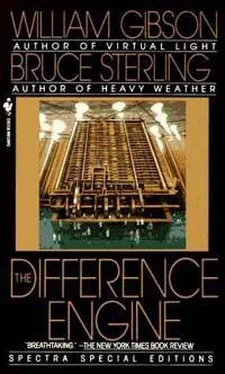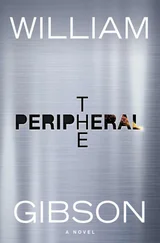William Gibson - The Difference Engine
Здесь есть возможность читать онлайн «William Gibson - The Difference Engine» весь текст электронной книги совершенно бесплатно (целиком полную версию без сокращений). В некоторых случаях можно слушать аудио, скачать через торрент в формате fb2 и присутствует краткое содержание. Жанр: sf_cyber_punk, fantasy_alt_hist, на английском языке. Описание произведения, (предисловие) а так же отзывы посетителей доступны на портале библиотеки ЛибКат.
- Название:The Difference Engine
- Автор:
- Жанр:
- Год:неизвестен
- ISBN:нет данных
- Рейтинг книги:3 / 5. Голосов: 1
-
Избранное:Добавить в избранное
- Отзывы:
-
Ваша оценка:
- 60
- 1
- 2
- 3
- 4
- 5
The Difference Engine: краткое содержание, описание и аннотация
Предлагаем к чтению аннотацию, описание, краткое содержание или предисловие (зависит от того, что написал сам автор книги «The Difference Engine»). Если вы не нашли необходимую информацию о книге — напишите в комментариях, мы постараемся отыскать её.
The Difference Engine — читать онлайн бесплатно полную книгу (весь текст) целиком
Ниже представлен текст книги, разбитый по страницам. Система сохранения места последней прочитанной страницы, позволяет с удобством читать онлайн бесплатно книгу «The Difference Engine», без необходимости каждый раз заново искать на чём Вы остановились. Поставьте закладку, и сможете в любой момент перейти на страницу, на которой закончили чтение.
Интервал:
Закладка:
"Anthropometry," the Prince suggested absently. "Eugenics. Powerful fields of learning, but less taxing, perhaps, to the youthful brain."
"Perhaps I might have a word with him. Your Highness," Oliphant said. "I know the lad means well."
"He is in his room, no doubt," the Prince said.
Oliphant made his way through the drafty glamor of the Royal Apartments to Alfred's room, where he was greeted with a whoop of glee, the Prince scrambling in bare-feet from mounded bedclothes and hopping nimbly across the tracks of a most elaborate miniature railway. "Uncle Larry! Uncle Larry! Brilliant! What have you brought for me?"
"Baron Zorda's latest."
In Oliphant's pocket, wrapped in green tissue and smelling strongly of cheap fresh ink, was a copy of 'Paternoster the Steam Bandit', by one "Baron Zorda," the third volume in the popular series, young Prince Alfred having expressed his unbridled enthusiasm for the two previous numbers, 'The Skeleton Amy' and 'Wheelmen of the Tsar'. The book's garishly colored cover depicted the daring Paternoster, pistol in hand, climbing from the cabin of a hurtling vehicle one took to be a gurney in the latest style—sheathed in tin, bulbous at the prow, and very narrow in the rear. The frontispiece, which Oliphant had examined in the Piccadilly news-agent's where he had purchased the volume, offered Baron Zorda's raffish highwayman in rather more detail, particularly in regard to his dress, which included a broad belt of studded leather and bell-bottomed trousers with buttoned vents at the cuffs.
"Super!" The boy eagerly tore the green tissue from Paternoster the Steam Bandit. "Look at his gurney. Uncle Larry! It's line-streamed like sixty!"
"Nothing but the swiftest for wicked Paternoster, Affie. And see the frontispiece. He's got up like Smashjaw Ned."
"Look at his narrow-go-wides," Alfred said admiringly. "And his bloody great belt!"
"And how have you been, Affie," Oliphant asked, ignoring the boy's lapse in language, "since my last visit?"
"Very well, Uncle Larry"—and a shadow of anxiety crossed the young face—"but I'm afraid I—I'm afraid she—she's broken, you see—" The Prince pointed to where the Japanese tea-doll slumped disconsolately against the foot of the massive four-poster, surrounded by a tumbled sea of lithographed tin and painted lead. A long sharp sliver of some translucent material protruded grotesquely from her gorgeous robe. "It's the spring, you see. I think it was wound too tightly, Uncle Larry. It sprang right out, on the tenth turn."
"The Japanese power their dolls with springs of baleen, Affie. 'Whale-whiskers,' they call the stuff. They haven't yet learned from us the manufacture of proper springs, but soon they shall. When they do, their dolls shan't break so easily."
"Father says you're too keen on your Japanese," Alfred said. "He says you think them the equal of Europeans."
"And I do, Affie! Their mechanical appliances are presently inferior, due to their lack of knowledge in the applied sciences. Some day, in futurity, they may lead civilization to heights yet untold. They, and perhaps the Americans…"
The boy regarded him dubiously. "Father wouldn't like that at all, what you said."
"No, I rather doubt he would."
Oliphant then spent half-an-hour, down on his knees upon the carpet, watching Alfred demonstrate a toy French Engine—operated, as was its cousin the Great Napoleon, by compressed air. The little Engine employed lengths of telegraph-tape, rather than cards, reminding Oliphant of his letter to M. Arslau. Bligh would have taken it 'round to the French Embassy by now; very likely it was already on its way to Paris by diplomatic pouch.
Alfred was connecting his Engine to a miniature kinotrope. There came a ceremonious rattle at the door-knob; the doors of Buckingham Palace were never knocked. Oliphant rose, and opened the tall white portal, to discover the well-known face of Nash, a palace valet-de-chambre, whose unwise speculations in railway shares had briefly made him the unwilling intimate of the Metropolitan Fraud Bureau. Oliphant's politesse had successfully smoothed the matter—a kindness well-invested, he saw now, by Nash's unfeigned air of respectful attention. "Mr. Oliphant," Nash announced, "a telegram has come, sir. Most urgent."
The velocity of the Special Branch vehicle contributed in no small part to Oliphant's general sense of unease. Paternoster himself could have asked for nothing faster, or more radically line-streamed.
They flew past St. James's Park with the speed of dream, the bare black branches of the lime-trees flashing by like wind-driven smoke. The driver wore leather goggles with round lenses, and plainly relished their headlong flight, periodically sounding a deep-throated whistle that sent horses rearing and pedestrians scurrying. The stoker, a burly young Irishman, was grinning maniacally as he shoveled coke into the burner.
Oliphant had no idea of their destination. Now, as they neared Trafalgar, the traffic caused the driver to yank the whistle-cord continually, steadily, setting up a mournful bellowing ululation, like the grief of some marine behemoth. The traffic, at this sound, parted like the Red Sea before Moses. Helmeted policemen saluted smartly as they sped past. Urchins and crossing-sweepers turned cartwheels of delight, at the sight of a sleek tin fish racketing down the Strand.
The evening had grown quite dark. As they entered Fleet Street, the driver applied the brake and worked a lever that released a mighty gout of uprushing steam. The line-streamed gurney bumped to a halt.
"Well, sir," the driver commented, raising his goggles to peer through the fretted glass of the vehicle's prow, "would you look at that."
Traffic, Oliphant saw, had been halted completely by the erection of wooden barricades hung with lanterns. Behind these stood grim-faced soldiers in combat drab, Cutts-Maudslay carbines unslung and at the ready. Beyond them, he saw sheets of canvas, loosely hung from raw timber uprights, as though someone were attempting to erect stage-scenery in the middle of Fleet Street.
The stoker swabbed his face with a polka-dot kingsman. "Something here the press aren't meant to see."
"They've put it in the wrong street, then," the driver said, "haven't they?"
As Oliphant climbed from the gurney, Fraser came walking quickly toward him. "We've found her," Fraser said glumly.
"And seem to have attracted considerable publicity in the process. Perhaps a few less infantry would be in order?"
"It isn't a matter for levity, Mr. Oliphant. You'd best come with me."
"Is Betteredge here?"
"Haven't seen him. This way, please." Fraser led the way between a pair of barricades. A soldier curtly nodded them past.
Oliphant glimpsed a mustachioed gentleman in urgent conversation with two Metropolitans. "That's Halliday," he said, "chief of Criminal Anthropometry."
"Yes, sir," Fraser said. "They're all over this one. The Museum of Practical Geology has been broken into. The Royal Society is angry as a nest of hornets, and bloody Egremont will be in every first-edition, calling it a Luddite outrage. Our only bit of luck would seem to be that Dr. Mallory is well away in China."
"Mallory? Why is that?"
"The Land Leviathan. Mrs. Bartlett and her cohorts attempted to make away with the thing's skull."
They rounded one of the makeshift barriers, its coarse fabric stamped at intervals with the broad-arrow mark of the Army Ordnance Department.
A cab-horse lay on its side in a great pool of darkening blood. The cab, a common one-horse fly, was overturned nearby, its dull black-lacquered panels stitched with bullet-holes.
"She was with two men," Fraser said. "Three if you count a corpse they left behind in the Museum. The hack was driven by a Yankee exile called Russell, a bully-rock bruiser living in Seven Dials. The other man was Henry Dease of Liverpool, quite the accomplished cracksman. I'd our Henry in dock ten times, when I was on the force, but no more. They're laid out there, sir." He pointed. "Russell, the driver, evidently got into a shouting match with a real cabman, over who should give way. A Metropolitan on traffic-duty attempted to intervene, at which point Russell produced a pistol."
Читать дальшеИнтервал:
Закладка:
Похожие книги на «The Difference Engine»
Представляем Вашему вниманию похожие книги на «The Difference Engine» списком для выбора. Мы отобрали схожую по названию и смыслу литературу в надежде предоставить читателям больше вариантов отыскать новые, интересные, ещё непрочитанные произведения.
Обсуждение, отзывы о книге «The Difference Engine» и просто собственные мнения читателей. Оставьте ваши комментарии, напишите, что Вы думаете о произведении, его смысле или главных героях. Укажите что конкретно понравилось, а что нет, и почему Вы так считаете.









